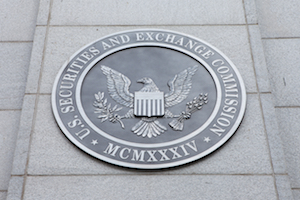 While the number of cases the Securities and Exchange Commission filed was down from last year, the financial remedies ordered set a new high, according to the Commission’s annual enforcement report.
While the number of cases the Securities and Exchange Commission filed was down from last year, the financial remedies ordered set a new high, according to the Commission’s annual enforcement report.
The fiscal year 2020 report by the Division of Enforcement shows that the total number of cases were down 17% from last year for a total of 715 enforcement actions, compared with 862 in FY 2019. Despite the lower overall enforcement action total, the Commission obtained judgments and orders totaling approximately $4.68 billion in disgorgement and penalties—apparently the highest amount on record. It also returned more than $600 million to harmed investors, according to the report.
The SEC also notes that it awarded $175 million to 39 whistleblowers in FY 2020, both the highest dollar amount and the highest number of individuals awarded in any fiscal year. In fact, awards issued in 2020 accounted for roughly 37% of the total number of individuals awarded over the entire life of the whistleblower program, the report notes.
Types of Cases
Of the 715 cases brought in FY 2020:
- 405 were “standalone” actions brought in federal court or as administrative proceedings;
- 180 were “follow-on” proceedings seeking bars based on the outcome of Commission actions or actions by criminal authorities or other regulators; and
- 130 were proceedings to deregister public companies—typically microcap—that were delinquent in their Commission filings.
Most of the SEC’s 405 standalone cases concerned securities offerings (32%), investment advisory and investment company issues (21%), and issuer reporting/accounting and auditing (15%) matters. The SEC also continued to bring actions relating to broker-dealers (10%), insider trading (8%) and market manipulation (5%).
Pace of Investigations
The SEC also continued to focus on shortening the amount of time it takes to complete investigations and recommend enforcement actions. The median time to file this past year was 21.6 months, which the Commission notes was a five-year best.
The Commission has also seen improvements in the length of time it takes to bring financial fraud and issuer disclosure cases. In appropriate cases, the SEC says that it is “increasing staffing, working to more efficiently triage issues, making more targeted requests at the outset, substantively engaging early in an investigation with relevant parties, and leveraging cooperation.” As a result, the SEC notes, it reduced the average amount of time it takes to complete these investigations from 37 months to 34 months.
The Impact of SEC v. Liu
According to the report, the U.S. Supreme Court’s decision in SEC v. Liu was an important decision for the Commission, but it also imposed some limitations and left open some questions. The high court’s decision from June 2020 affirmed the authority of courts to order disgorgement through their power to order “equitable relief” under Section 21(d)(5) of the Exchange Act. The Court, according to the report, held that disgorgement should reflect net profits, and that “legitimate” expenses should generally be backed out. The Court also emphasized the importance of returning disgorged funds to harmed investors.
The Division notes that it continues to evaluate the impact of the decision and how the questions that the Court left open will affect the Commission going forward. As a result, there have been and will continue to be changes in the balance between the penalties and disgorgement that the Division seeks and recommends to the Commission, the report explains. Among other things, the SEC says that it may recommend higher penalties in some cases where the statutory scheme permits them to do so.
Conflict Disclosure
The importance of disclosing conflicts of interest remains a priority. The Commission points to its Share Class Selection Disclosure Initiative that was concluded during FY 2020, resulting in the SEC ordering nearly 100 investment advisory firms that voluntarily self-reported to the Division to return more than $139 million to investors.
The SEC notes that other potential undisclosed conflicts can include advisers’ use of cash sweep arrangements. In some cases, according to the SEC, an adviser that is either dually registered or has an affiliated broker-dealer has a conflict of interest in recommending one cash investment over another because it receives revenue sharing payments from its clearing broker when selecting particular cash sweep products. “Just as with mutual fund share class selections, advisers recommending or choosing between different cash sweep products must make full and fair disclosure of these types of conflicts,” the report advises.
Another potential area of concern for advisory clients is the transparency of fee structures around their accounts. For example, the SEC notes that “wrap fee programs” offer accounts in which clients pay an asset-based “wrap fee” that covers investment advice and brokerage services, including trade execution.
The SEC notes that in May 2020 it found that a firm had disseminated marketing and client communications that gave the misleading impression that wrap fee clients were not likely to incur additional trade execution costs, even though the firm’s order routing practices resulted in some instances in the clients paying additional transaction fees that were not visible to them.

